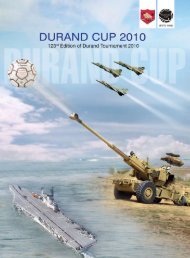Shimla-the birthplace of the Durand Cup and the Indian Air Force ...
Shimla-the birthplace of the Durand Cup and the Indian Air Force ...
Shimla-the birthplace of the Durand Cup and the Indian Air Force ...
Create successful ePaper yourself
Turn your PDF publications into a flip-book with our unique Google optimized e-Paper software.
Decline <strong>of</strong> Regimental teams in <strong>the</strong><br />
<strong>Dur<strong>and</strong></strong> Tournament<br />
By Novy Kapadia<br />
Going down memory lane, it is interesting to note that<br />
from 1888-1940 British regimental teams held sway<br />
in <strong>the</strong> <strong>Dur<strong>and</strong></strong> tournament. The first civilian team to<br />
contest <strong>the</strong> final was <strong>the</strong> East India Railways in 1927.<br />
The East India Railways team consisted entirely <strong>of</strong> <strong>Indian</strong><br />
players. Assisted by stalwarts like Samad, Rabi Ganguly,<br />
P. Bhowmick<strong>and</strong> <strong>and</strong> B. Das, <strong>the</strong> Railway team went down<br />
gallantly to <strong>the</strong> York <strong>and</strong> Lancashire Regiment by 0-2 in <strong>the</strong> final.<br />
Young Men <strong>of</strong> Delhi once reached <strong>the</strong> semi-finals as did Aryans<br />
Club <strong>of</strong> Calcutta in 1936. The first team to break <strong>the</strong> monopoly<br />
<strong>of</strong> British regimental teams was <strong>the</strong> mighty Mohammedan<br />
Sporting when <strong>the</strong>y beat <strong>the</strong> Royal Warwickshire Regiment 2-1<br />
in <strong>the</strong> final, with goals by centre forward Hafiz Rashid <strong>and</strong> <strong>the</strong><br />
slick inside left Saboo.<br />
A new era began when <strong>the</strong> tournament was revived in New<br />
Delhi, <strong>the</strong> capital <strong>of</strong> independent India. Civilian teams now<br />
started dominating <strong>the</strong> <strong>Dur<strong>and</strong></strong> tournament. Hyderabad City<br />
Police won in 1950 <strong>and</strong> 1954, East Bengal in 1951 <strong>and</strong> 1952<br />
<strong>and</strong> Mohun Bagan in 1953. Regimental teams <strong>of</strong> <strong>the</strong> <strong>Indian</strong><br />
Army were getting pipped at <strong>the</strong> post but not totally eclipsed<br />
as is happening nowadays. In both 1955 <strong>and</strong> 1958, <strong>the</strong> final<br />
was contested between two teams from <strong>the</strong> Services. In 1955<br />
Madras Regimental Centre (MRC) Wellington annexed <strong>the</strong><br />
<strong>Dur<strong>and</strong></strong> tournament for <strong>the</strong> first time, beating <strong>Indian</strong> <strong>Air</strong> <strong>Force</strong><br />
26 July 2011 purple beret<br />
3-2 in <strong>the</strong> replayed final. The match on <strong>the</strong> first day ended in<br />
a goal less draw. D’Cruz, Alfonso <strong>and</strong> Alwyn scored for <strong>the</strong><br />
winners. In 1958 for <strong>the</strong> first time since Independence <strong>the</strong> final<br />
was contested between two regimental sides. MRC Wellington,<br />
with mighty goalkeeper Peter Thangaraj in <strong>the</strong>ir ranks ousted<br />
spirited Gorkha Brigade 2-0 in <strong>the</strong> final with Mukundan <strong>and</strong><br />
Abu Backer scoring <strong>the</strong> goals.<br />
Till <strong>the</strong> end <strong>of</strong> <strong>the</strong> sixties, regimental teams were a force to<br />
reckon with in <strong>the</strong> <strong>Dur<strong>and</strong></strong> tournament. Gorkha Brigade twice<br />
emerged winners in 1966 <strong>and</strong> 1969. In 1966 in an all regimental<br />
team final, Gorkha Brigade beat Sikh Regimental Centre<br />
(SRC) 2-0 in <strong>the</strong> final. Then three years later, inspired by <strong>the</strong><br />
mercurial Shyam Singh Thapa <strong>the</strong>y beat BSF 1 -0 in <strong>the</strong> final<br />
to lift <strong>the</strong> trophy for <strong>the</strong> second time. After that it has been<br />
downhill all <strong>the</strong> way. No team from <strong>the</strong> Services has entered<br />
<strong>the</strong> <strong>Dur<strong>and</strong></strong> final since <strong>the</strong>n. <strong>Indian</strong> <strong>Air</strong> <strong>Force</strong> (IAF) sparkled<br />
briefly in <strong>the</strong> late seventies, with <strong>the</strong>ir excellent forwards Subir<br />
Sarkar <strong>and</strong> Unni <strong>and</strong> playmaker Paul Raj. The Services Sports<br />
Control Board (SSCB), alarmed at declining st<strong>and</strong>ards, started<br />
<strong>the</strong> concept <strong>of</strong> <strong>the</strong> Army XI, a select team drawn from different<br />
regiments which competed in various tournaments. Somehow<br />
this concept has not taken <strong>of</strong>f. Army XI is nei<strong>the</strong>r as charismatic<br />
nor as feared as <strong>the</strong> regimental teams like Gorkha Brigade, MRC<br />
Wellington or MEG Bangalore <strong>of</strong> yore. In <strong>the</strong> nineties only once



